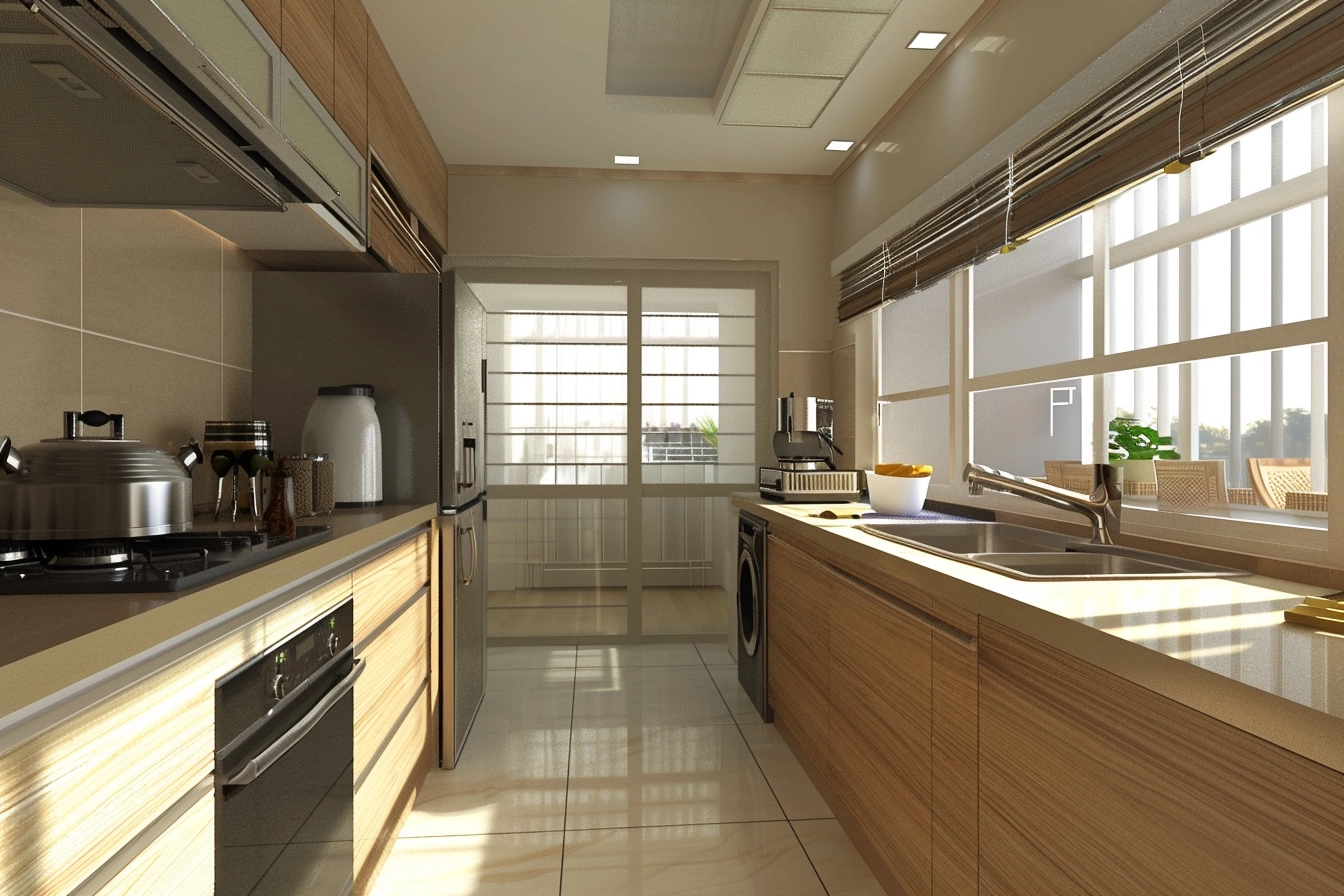Kitchen remodeling in Singapore presents an exciting opportunity for homeowners to transform their spaces, yet it comes with its share of challenges. Whether the project is a minor upgrade or a full-scale renovation, meticulous planning is essential for a successful outcome. Here’s a comprehensive guide on what to consider when undertaking a kitchen remodel in Singapore.
First and foremost, establishing a realistic budget is crucial. Factors such as the kitchen’s size, the extent of renovation, and desired materials and finishes should all be taken into account. It’s prudent to allocate funds for unexpected expenses that may arise during the remodeling process.
Next, evaluating the layout and functionality of the existing kitchen space is essential. Identifying areas for improvement and prioritizing features that enhance workflow and usability will inform the design process. Collaborating with a professional designer or architect can help create a well-planned layout tailored to specific needs and preferences.
Determining the style and design aesthetic is another important consideration. Whether opting for a modern, classic, or contemporary look, selecting finishes, colors, and materials that reflect personal taste and complement the home’s overall design theme is key.
Investing in high-quality materials and finishes is essential for durability and longevity, particularly in Singapore’s humid climate. From countertops to cabinetry and flooring, choosing resilient materials that are easy to maintain is paramount.
Prioritizing storage solutions is crucial for maximizing space and keeping the kitchen organized. Custom cabinetry with built-in organizers, pull-out shelves, and deep drawers can efficiently store cookware and pantry items while utilizing vertical space with tall cabinets or open shelving can provide additional storage options.
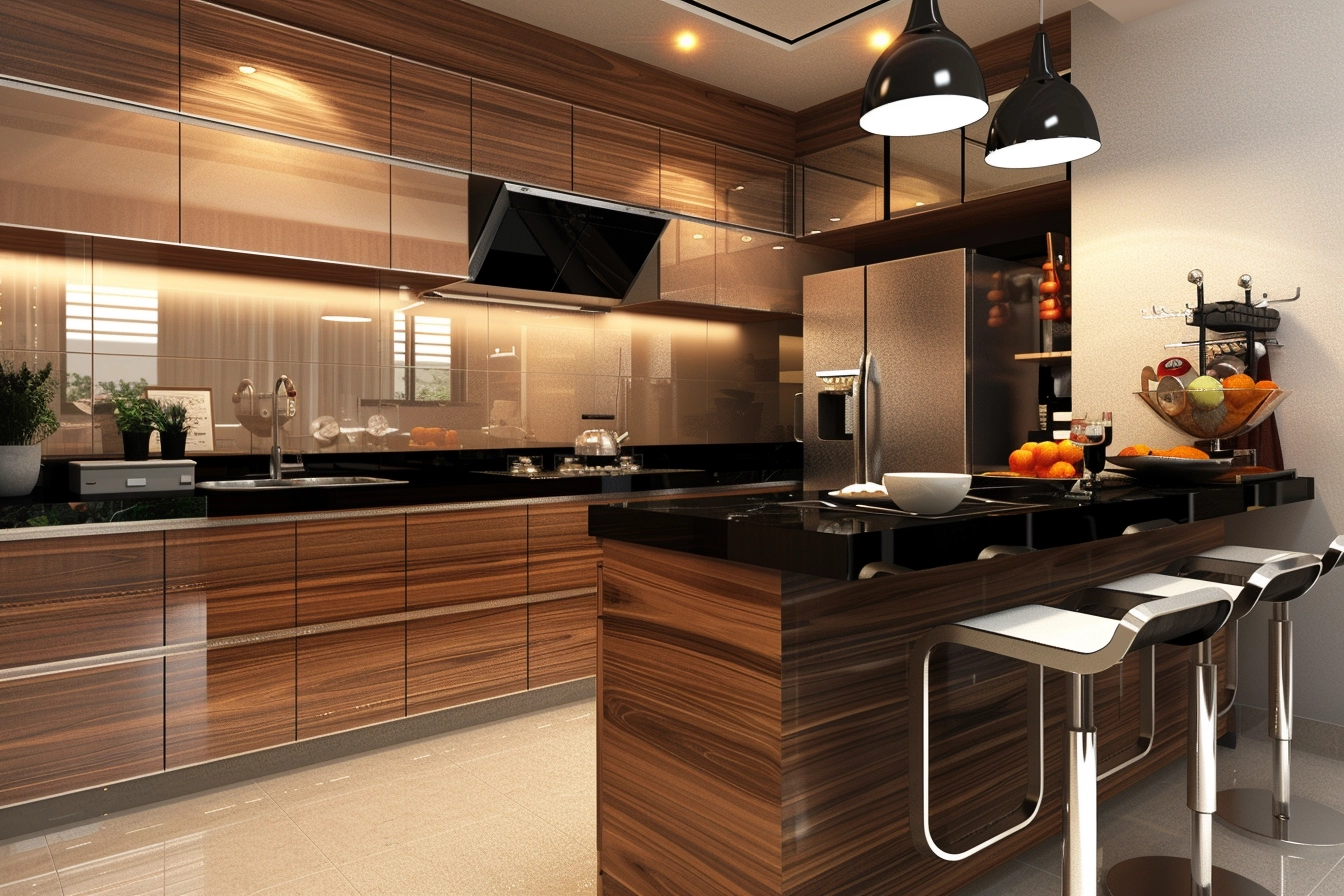
Selecting energy-efficient appliances and fixtures not only enhances functionality but also reduces energy consumption and utility costs. Considering size, features, and brand reputation when choosing appliances such as refrigerators, ovens, and dishwashers ensures optimal performance.
Incorporating adequate lighting into the kitchen design creates a bright, inviting, and functional space. Combining ambient, task, and accent lighting illuminates work areas, highlights architectural features, and enhances the overall ambiance.
Ensuring proper ventilation is essential for removing cooking odors, excess moisture, and indoor air pollutants. Installing a range hood or exhaust fan that effectively vents cooking fumes to the exterior of the home is vital for maintaining air quality.
Adhering to building codes and regulations governing kitchen renovations is imperative. Obtaining necessary permits and approvals from relevant authorities and ensuring compliance with safety standards for electrical, plumbing, and gas installations are essential for a safe and successful remodel.
Lastly, hiring experienced contractors, designers, and tradespeople with a proven track record is essential. Seeking recommendations, checking references, and assessing portfolios can help ensure quality workmanship and customer satisfaction throughout the remodeling process.
By carefully considering these factors and planning accordingly, homeowners can embark on their kitchen remodeling journey in Singapore with confidence, knowing they’ve covered all essential aspects to achieve a functional, stylish, and comfortable space that enhances their home and lifestyle.
Cost of Renovating Your Kitchen in Singapore
Understanding the cost of kitchen renovation in Singapore is crucial for homeowners embarking on this significant project. Costs can vary widely based on the scope of work, quality of materials, and desired outcomes. For those considering a basic renovation, budgeting between SG$ 5,000 to SG$ 10,000 is a common range, while moderate renovations typically fall within SG$ 15,000 to SG$ 20,000. Extensive projects, on the other hand, may start from SG$ 25,000 and increase based on complexity and customization.
Breaking down the major tasks involved in kitchen renovation provides a clearer picture of where expenses may lie. Dismantling and demolition, the initial step, can cost between SG$ 500 to SG$ 3,500, depending on the extent of work required. Carpentry and kitchen cabinet renovation, a significant aspect of any kitchen remodel, range from SG$ 3,500 to SG$ 6,000, with costs per square foot varying based on materials and design choices.
Kitchen countertops, another focal point of the space, often require a significant investment ranging from SG$ 2,500 to SG$ 7,000, depending on material and size. Tiles and flooring costs are influenced by factors such as tile type and installation method, with ceramic tiles ranging from SG$ 9 to SG$ 12 per square foot and marble or granite tiles up to SG$ 15 per square foot.
Plumbing and sink renovation, essential for functionality and aesthetics, can cost SG$ 800 to SG$ 2,000, depending on the sink and plumbing updates required. Updating kitchen electric appliances adds another layer of expense, ranging from SG$ 1,500 to SG$ 10,000, depending on appliance type and brand.
Additional expenses such as paintwork, electrical work, and miscellaneous charges including waterproofing, debris removal, cleaning, and permit fees should also be factored into the overall budget. Planning and budgeting accordingly for each aspect of the renovation process can help homeowners achieve their desired kitchen transformation within their financial means.
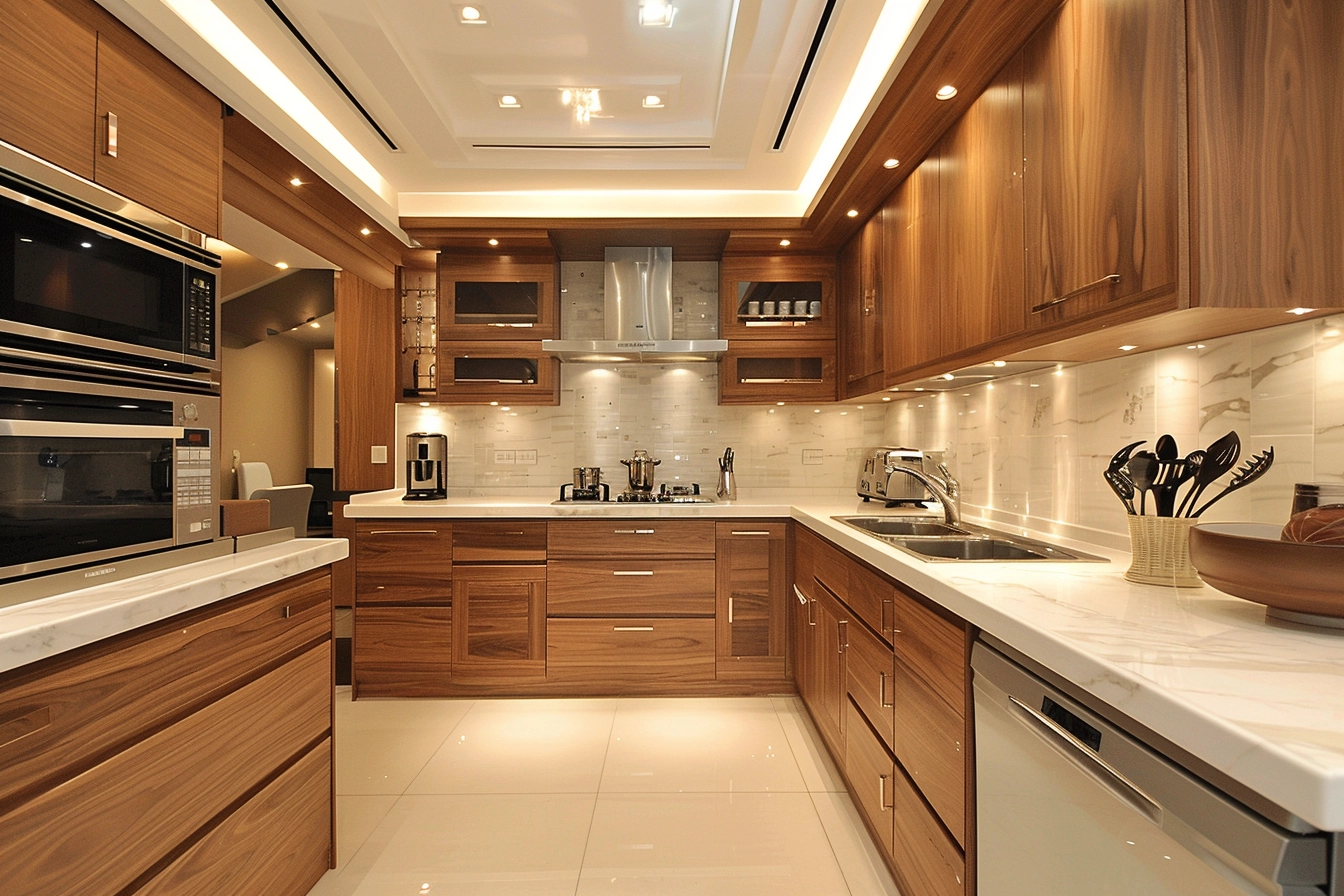
Feasibility of Open Concept Kitchens in Singapore
Assessing the feasibility of island kitchens and open-concept kitchens in Singapore involves considering various factors, including space availability, layout considerations, practicality, and design preferences.
Island kitchens, characterized by a standalone countertop in the center of the kitchen space, can be a stylish and functional addition to homes in Singapore. However, their feasibility depends on the available floor space. In smaller homes or apartments with limited square footage, incorporating an island kitchen may not be practical as it can impede traffic flow and restrict movement within the kitchen. In such cases, homeowners may need to opt for alternative layouts that maximize space efficiency while still meeting their needs.
For larger homes or residences with ample floor space, island kitchens can offer numerous benefits. They provide additional countertop workspace for meal preparation, dining, and entertaining, as well as extra storage options with the inclusion of cabinets or drawers beneath the countertop. Island kitchens also facilitate social interaction by creating a centralized gathering area where family members and guests can congregate while meals are being prepared.
Open-concept kitchens, which integrate the kitchen with adjacent living or dining areas, have become increasingly popular in Singaporean homes. However, their feasibility depends on factors such as the structural layout of the home, lifestyle preferences, and privacy considerations. In smaller or older homes with compartmentalized layouts, achieving an open-concept kitchen may require extensive renovation work, including the removal of walls or partitions, which can be costly and complex.
In contrast, newer homes or properties with spacious layouts may already feature open-concept designs, making it easier to incorporate a seamless transition between the kitchen and adjoining living or dining spaces. Open-concept kitchens promote a sense of spaciousness, light, and connectivity, enhancing social interaction and facilitating multitasking activities such as cooking, dining, and entertaining.
When assessing the feasibility of island kitchens and open-concept designs, it’s essential to consider practicality and functionality alongside aesthetic appeal. Homeowners should work closely with designers, architects, or renovation professionals to evaluate their specific needs, spatial constraints, and budgetary considerations. By carefully planning and customizing the design to suit their lifestyle and preferences, homeowners can create island kitchens and open-concept spaces that enhance the functionality, aesthetics, and value of their homes in Singapore.
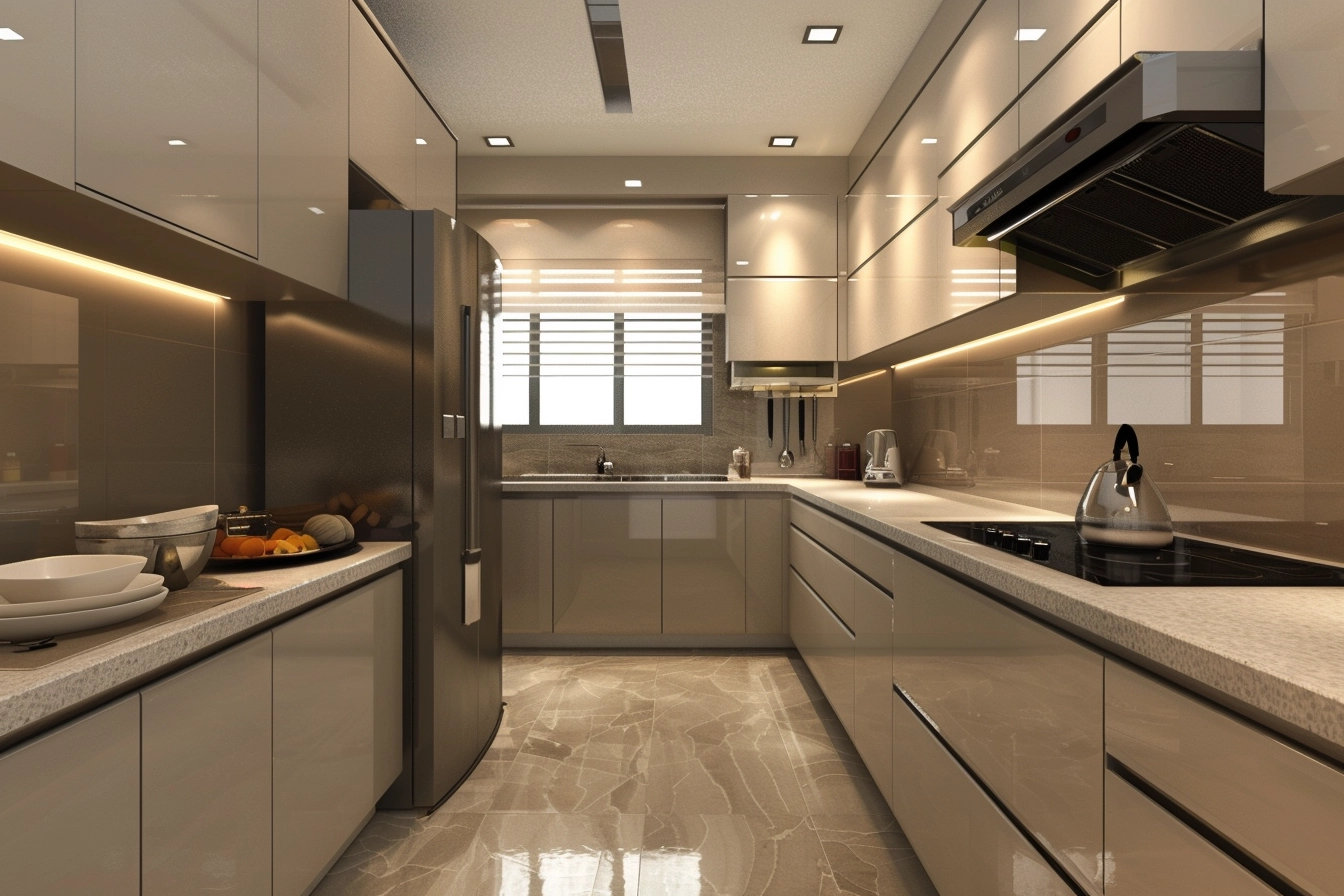 Choosing a Gas or Electricity Stove
Choosing a Gas or Electricity Stove
When considering whether to choose a gas or electric stove in Singapore, several factors come into play, each with its own advantages and considerations.
Gas stoves are a popular choice due to their affordability and the precise control they offer over cooking temperatures. In Singapore, where cooking is a significant aspect of daily life, many homeowners appreciate the responsiveness and versatility of gas burners. Additionally, gas stoves are often favored for their ability to achieve high heat quickly, which is ideal for tasks such as stir-frying and boiling.
On the other hand, electric stoves are known for their ease of use and maintenance. Electric cooktops typically feature smooth surfaces that are easy to clean, making them a convenient option for busy households. In Singapore’s humid climate, where mold and mildew can be a concern, the seamless design of electric stoves can be particularly appealing. Furthermore, electric stoves offer consistent heat distribution, which can be beneficial for tasks that require precise temperature control, such as baking.
Ultimately, the decision between gas and electric stoves in Singapore depends on personal preferences, cooking habits, and budget considerations. Some homeowners may prioritize the responsiveness and affordability of gas stoves, while others may prefer the convenience and ease of maintenance offered by electric stoves. By carefully weighing these factors, homeowners can choose the stove type that best suits their needs and enhances their cooking experience in Singapore’s vibrant culinary landscape.
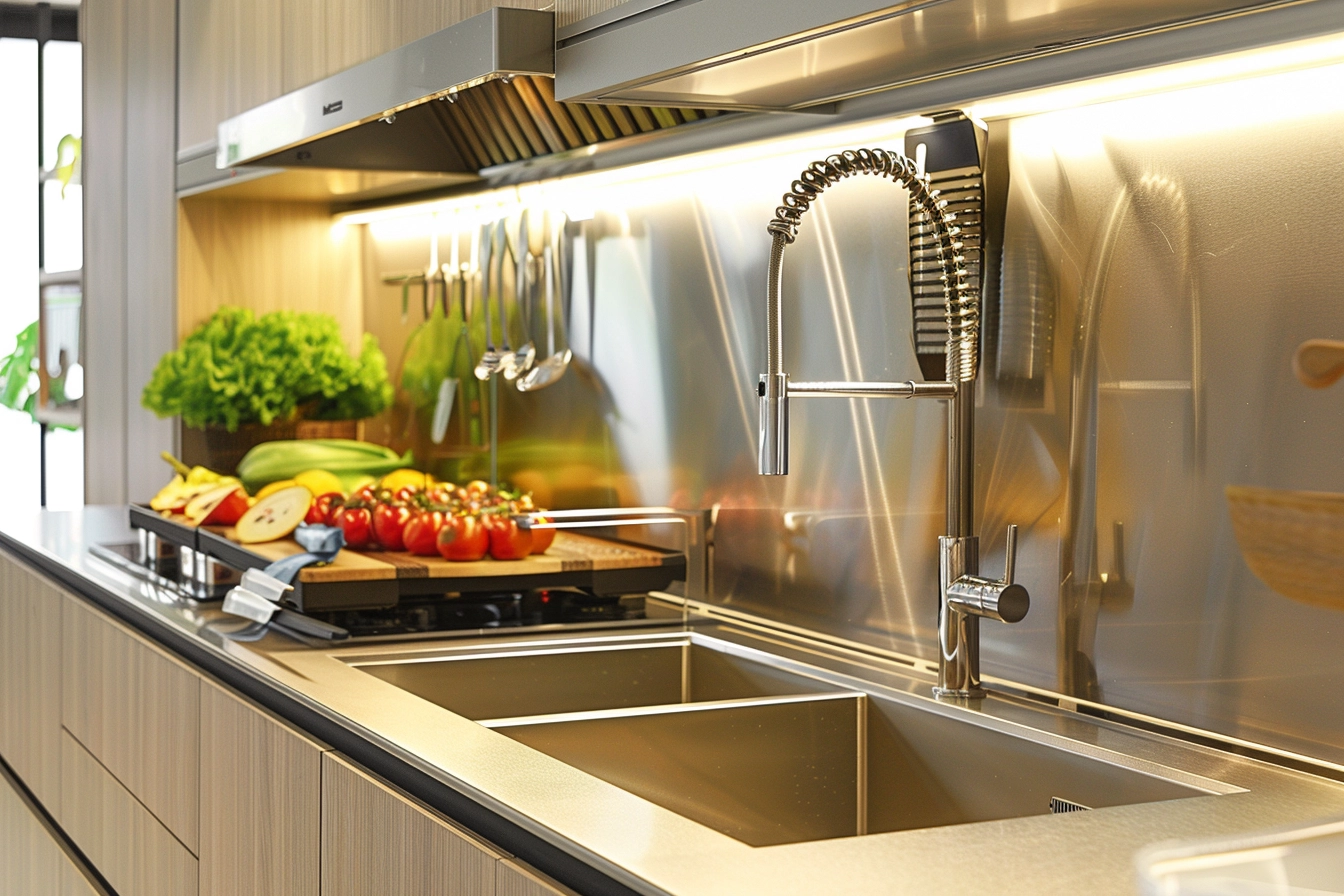 Essential Kitchen Appliances and Dimensions
Essential Kitchen Appliances and Dimensions
When designing your kitchen, deciding on the kitchen appliances to install and their dimensions is a crucial step in creating a functional and efficient space tailored to your needs. Considerations should include the size and layout of your kitchen, as well as your cooking habits and lifestyle.
Firstly, the fridge is a fundamental appliance that requires careful consideration. Determine the appropriate size and location for the refrigerator, ensuring easy access while allowing for adequate clearance for door swings and ventilation.
Next, decide whether to install a stove and choose between gas or electric based on personal preferences and cooking requirements. Consider the size and configuration of the cooktop or range, ensuring sufficient counter space and ventilation for safe and efficient cooking.
Additionally, consider whether to install an oven, which can expand your cooking capabilities and versatility. Built-in ovens or combination microwave ovens offer convenience and space-saving solutions for smaller kitchens.
For added convenience, you may opt to install a dishwasher, which can save time and effort in cleaning up after meals. Ensure sufficient space and plumbing connections for the dishwasher, and consider models with customizable racks and energy-efficient features.
A drying rack is another practical addition to consider, providing a designated space for drying dishes and utensils. Wall-mounted or countertop drying racks can save valuable counter space and promote air circulation for faster drying.
Other appliances to consider include a microwave, which offers quick and convenient heating and cooking options, as well as small appliances such as a toaster, coffee maker, blender, and food processor, depending on your culinary preferences and lifestyle.
When selecting appliances, prioritize energy efficiency, durability, and ease of maintenance to maximize functionality and longevity. Carefully plan the layout and dimensions of each appliance to optimize workflow and ensure a cohesive and efficient kitchen design tailored to your specific needs and preferences.
Fengshui Principles in Kitchen Renovation
Incorporating Feng Shui principles into kitchen renovation can significantly influence the atmosphere and energy of the space. One key consideration is the optimal location of the kitchen within the home, ideally positioned away from the main entrance to contain cooking-related activities and prevent negative energy from entering. If relocation isn’t feasible, strategic placement of mirrors or screens can help deflect unwanted energy.
A balanced layout is essential to promote smooth movement and energy flow within the kitchen. Avoiding cramped or cluttered spaces and ensuring that the stove, sink, and refrigerator form a harmonious triangular arrangement known as the “Feng Shui Triangle” can enhance efficiency and harmony in the space.
Ample natural light and ventilation contribute to positive energy flow within the kitchen. Incorporating features such as windows, skylights, or glass doors allows natural light to penetrate the space, while proper ventilation helps disperse stagnant energy and maintain a healthy indoor environment.
Color selection plays a vital role in creating the desired energy within the kitchen. Choosing colors that resonate with the elements of Fire and Earth, such as reds, oranges, yellows, and earth tones, can stimulate appetite and promote vitality, while avoiding dark or cold colors prevents the creation of a heavy and stagnant atmosphere.
Selecting high-quality, natural materials for countertops, flooring, and cabinetry enhances the kitchen’s energy. Smooth, rounded surfaces are preferred to promote gentle energy flow, while avoiding materials that emit toxins or have sharp edges ensures a harmonious environment.
Maintaining a clutter-free environment is essential to prevent stagnant energy from accumulating in the kitchen. Regular decluttering and cleaning help maintain a harmonious and uplifting atmosphere, promoting positive energy flow throughout the space.
Thoughtful placement of kitchen appliances contributes to positive energy flow and functionality. Avoiding placing the stove directly opposite the sink or refrigerator and ensuring appliances are in good working condition enhances the kitchen’s energy.
Enhancing the energy of the stove, symbolizing wealth and nourishment in Feng Shui, involves keeping it clean, well-maintained, and decorated with symbols of abundance such as fresh herbs, fruits, or flowers.
Incorporating natural elements such as potted plants, fresh flowers, or bowls of fruit further enhances the kitchen’s energy, bringing vitality and freshness into the space.
Consulting with a Feng Shui expert for personalized adjustments and recommendations based on specific kitchen layout and energy flow can provide valuable insights and guidance in creating a harmonious and auspicious kitchen environment tailored to individual needs and aspirations.
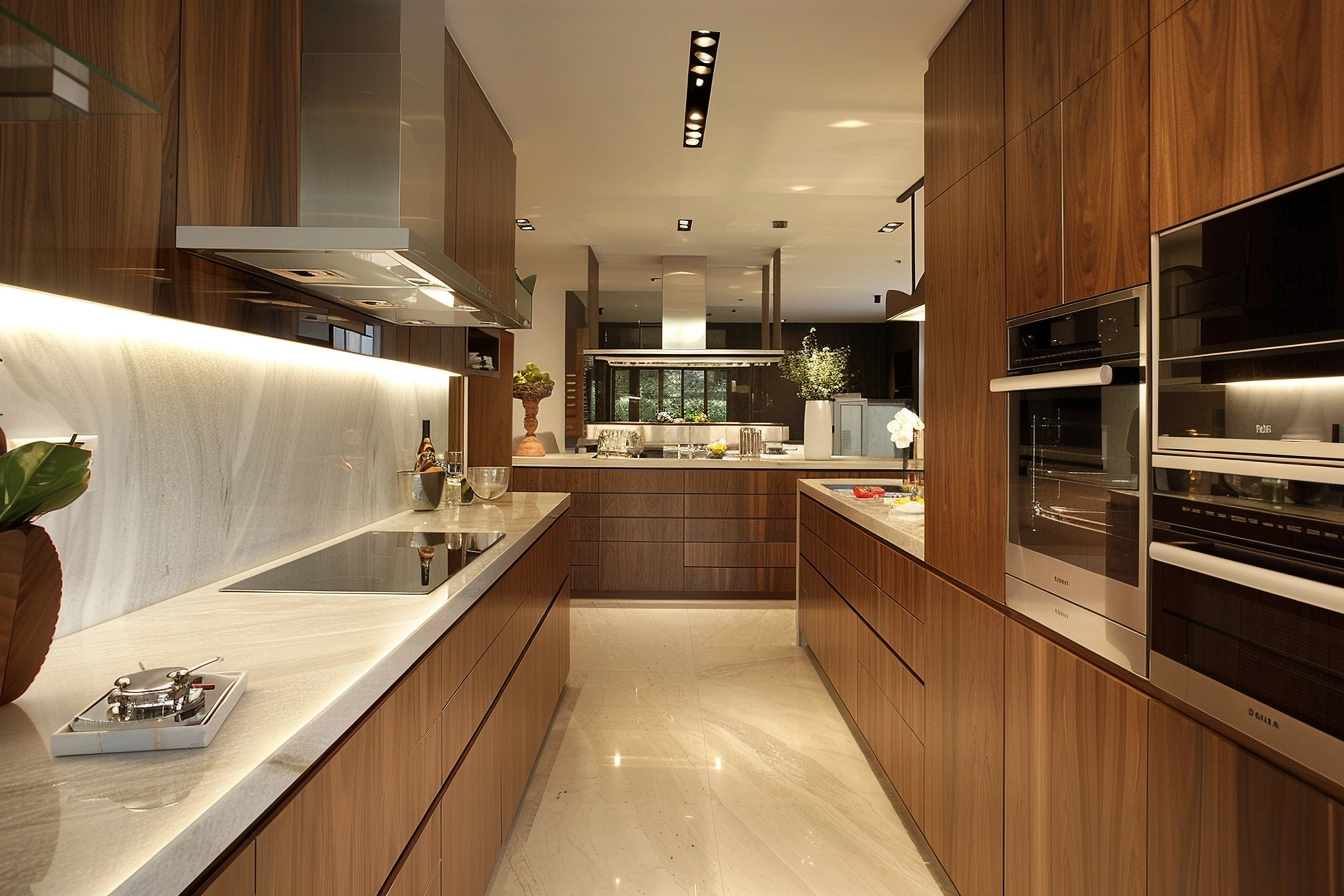
Important Things to Consider When Renovating Your Kitchen
When renovating your kitchen in Singapore, it’s essential to keep several key considerations in mind to ensure a smooth and compliant process. Firstly, adherence to HDB rules is paramount. Obtaining written approval from the Housing and Development Board for any demolition work and adhering to guidelines regarding layout changes are crucial steps. Additionally, selecting renovation contractors from the Directory of Renovation Contractor Singapore (DRC) is mandatory to avoid legal repercussions.
Timings for renovation work must also align with HDB regulations to prevent inconvenience to neighbors. Being mindful of specified times designated for renovation tasks is imperative to maintain harmony within the community and comply with regulations.
Clarifying the scope of your renovation project is essential to ensure compliance with both HDB and Urban Redevelopment Authority guidelines. Any alterations must adhere to these regulations to avoid complications during or after the renovation process.
Proper waste disposal is another critical consideration. Renovation contractors must dispose of waste materials responsibly, following proper disposal procedures to avoid environmental hazards and legal issues.
Lastly, when selecting renovation contractors, it’s crucial to prioritize hiring registered professionals in Singapore. Ensuring compliance with HDB rules and guidelines is easier when working with reputable contractors who understand and adhere to legal requirements. By keeping these considerations in mind, homeowners can navigate the kitchen renovation process effectively and achieve their desired outcomes within regulatory frameworks.


